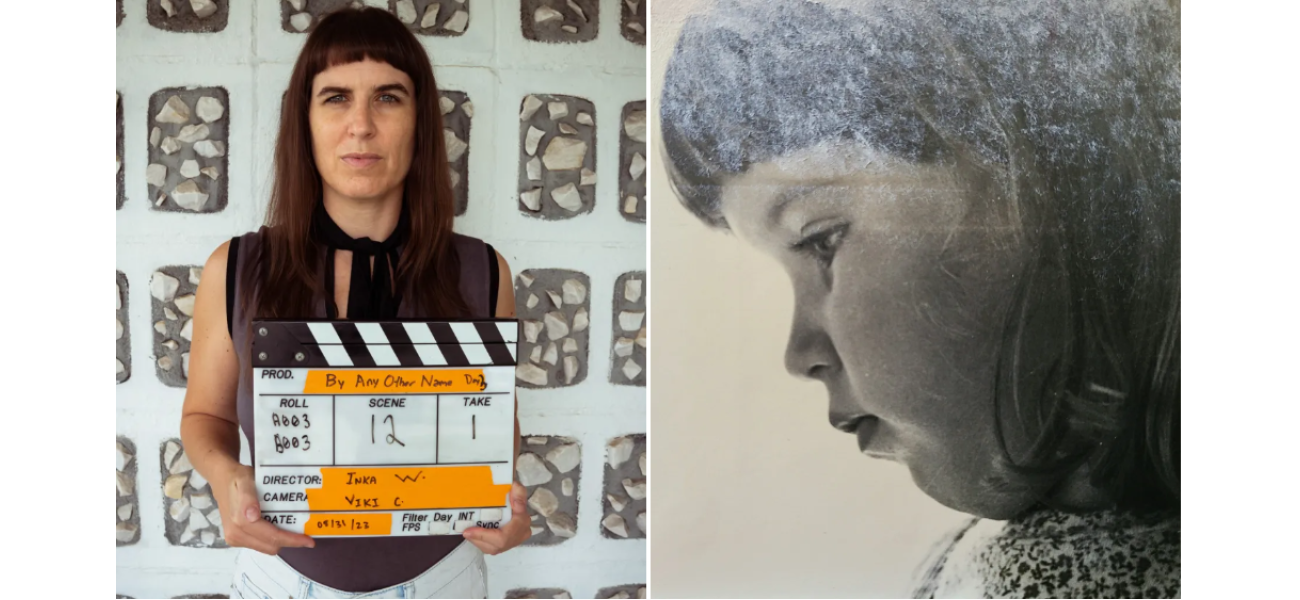Surviving a sex cult upbringing, creating feminist pornography aided in healing my trauma.
Women were required to sleep with many men.
November 28th 2024.

The commune was a frightening place for a little girl like Inka, who had no parents around to protect her. She doesn't remember the day she arrived there, as she was just a small child at the time. Her father had abandoned the family, and her mother had to find work in Berlin. So, at the age of four, Inka was left in the care of a "socialist living experiment" just outside Vienna.
Her mother believed that the commune would be the perfect place for Inka to stay while she earned enough money to support them both. She made sure to visit regularly, but for Inka, who now has a good relationship with her mother, talking about their past is difficult. She's not sure if she was too young to remember their separation, or if she blocked it out to protect herself from the trauma.
At the time, Inka didn't realize that the seemingly utopian community she was expected to call home was actually a sex cult. The leader, Otto Muehl, was a former Nazi soldier who believed in the concept of "free love." This meant that members were expected to sleep with everyone, possessions and childcare were communal, and nudity was commonplace. Family relationships were forbidden, and Muehl's Friedrichshof Commune soon descended into a place of control and manipulation.
The commune was eventually dissolved in 1990, but for Inka, life there was confusing and frightening. She describes it as similar to a farm or country estate, where she was introduced to sex at a very young age. She and the other children were placed in "family units" with a handful of adults who were supposed to take care of them. However, despite the large number of people around, Inka often felt lonely and had no one to turn to for comfort or support. She remembers feeling confused and scared, not knowing who to go to when she was hurt or upset.
Muehl believed that traditional family structures and monogamy were hindering human development, and he separated children from their parents. This meant that Inka and the other children were constantly moved from one "substitute family" to another, preventing them from forming meaningful connections. Anyone who didn't agree with the commune's rules was punished, ridiculed, or degraded by Muehl and the collective.
Behind the facade of "free love," Muehl operated as an authoritarian leader, dismissing and belittling those who challenged his beliefs. Sex was openly discussed and critiqued among members, with Muehl even banning foreplay, homosexuality, and loving relationships. Teenage girls were forced to have sex with Muehl, but Inka managed to escape this fate as she left the cult at the age of 12.
Looking back, Inka remembers Muehl as a disgusting and repulsive man. He expected his followers to have sex multiple times a day, with people coming home from work for lunch just for that purpose. This meant that Inka, who slept in rooms with her substitute mothers, was constantly exposed to sexual activity from a very young age. She recalls feeling frightened at times, and even crying while watching strangers have sex with her substitute mothers.
Nudity was also a common occurrence in the commune, and Inka remembers being asked to touch naked adults. The atmosphere was always sexual, and in the evenings, members would participate in an activity called "selbstdarstellung," which was meant to promote self-expression but actually did the opposite. It was just another way for Muehl to control and manipulate his followers.
From the outside, the commune may have appeared free and idyllic, but in reality, it was highly regulated and controlled. After school, the children were subjected to a daily ritual called "palaver," where their behaviors were scrutinized by Muehl and the higher-ups in the hierarchy. Inka explains that each person was given a number, with Muehl being number one and his wife being number two. The children would be placed in the middle of a circle while the adults discussed their "bad" behaviors. This created a sense of fear and shame, as anyone who didn't conform to Muehl's rules would be punished and moved lower in the hierarchy.
Inka's coping mechanism was to always try and do everything correctly, so she would remain high in the hierarchy and avoid punishment. However, she remembers one instance where she didn't do something she was supposed to, and she was immediately lowered in the hierarchy. Shame was used as a tool to control and manipulate the members of the commune, making them compliant to Muehl's desires.
Inka's childhood in the commune was a confusing and frightening experience, where she was constantly exposed to sexual activity and manipulation. It was a far cry from the idyllic and free lifestyle that was portrayed to the public.
Life in the commune was a daunting experience for a little girl like Inka, who had no parents around. She was brought to the commune as a young child, with no memory of the day she arrived. Her father had left the family, and her mother had to work in Berlin to support them. So, at the age of four, Inka found herself at the headquarters of a 'socialist living experiment' just outside Vienna. Her mother believed that the commune would be the perfect place for her daughter to stay while she earned money to provide for them. She made sure to visit Inka regularly, but for Inka, who now has a good relationship with her mother, talking about their past is difficult. She is unsure if she was too young to remember the separation, or if she has blocked it out to protect herself from the trauma.
At the time, the commune seemed like a utopian community, but it soon descended into a sex cult. The leader, Otto Muehl, was a former soldier who had fought for Nazi Germany. He believed in 'free love' and expected all members to engage in sexual activities with each other. The commune was a place where possessions and childcare were communal, nudity was normal, and family relationships were forbidden. In 1990, the commune was dissolved, ending Inka's eight-year stay there.
Inka describes the commune as similar to a farm or a country estate, but for a young child, it was confusing and frightening. She was introduced to sex at a very early age, and the 'family units' that she was placed in only added to her emotional loneliness. She longed for someone to turn to when she was hurt or in need, but with no one to confide in, she felt lost. Muehl believed that traditional family structures hindered human development, and he separated children from their parents. The children in the commune slept in rooms with substitute parents, who would change periodically to prevent any emotional connections from forming.
When Inka formed a close friendship with another little boy, they were quickly punished for it. At just five years old, they were accused of having a relationship and were shamed in front of everyone. Inka was devastated when she was kicked out of her 'family' and placed with another group. Over the years, she had at least five substitute mothers and fathers, but any form of dissent was met with punishment or ridicule from Muehl and his followers. He was an authoritarian figure, and his behavior was often cruel and abusive.
Behind the facade of 'free love,' the commune was highly regulated and controlled. Muehl believed that society's problems stemmed from suppressed sexuality, and he banned foreplay, homosexuality, and emotional or loving relationships. Members were expected to have sex multiple times a day, and even those who worked outside the commune would come home for lunch to engage in sexual activities with different partners. As a young child, Inka was exposed to this constant sexual activity, as she slept in rooms with her substitute mothers.
Nudity was also a common occurrence in the commune, and Inka remembers being asked to touch naked adults. Sex was openly discussed at all times, and occupants would critique each other's sexual performance. In the evenings, the members would participate in an activity called 'selbstdarstellung,' which was meant to promote self-representation, but in reality, it was the opposite. The group would sing, dance, and engage in nude drawing, giving the impression of an idyllic life. However, Inka recalls the emotional weight of these activities and how they were used to control and regulate the members.
Every day, the children's behaviors were scrutinized in a ritual called 'palaver.' The adults would sit in a circle, with the children in the middle, and discuss any 'bad' behavior. The children were given a number to denote their place in the hierarchy, with Muehl and his wife at the top. Inka's coping mechanism was to always try and do everything correctly, which often resulted in her being high in the hierarchy. However, she remembers one incident when she was five or six, and forgot to get a broom as she was told. As a result, she was lowered in the hierarchy, and she recalls feeling ashamed. Shame was often used as a means of control in the commune.
Inka's time in the commune was marked by confusion, fear, and trauma. Although she has since left and built a new life for herself, the memories of her past continue to haunt her. The commune may have appeared to be a place of 'free love,' but in reality, it was a highly controlled and regulated environment, with Muehl at its authoritarian center.
Her mother believed that the commune would be the perfect place for Inka to stay while she earned enough money to support them both. She made sure to visit regularly, but for Inka, who now has a good relationship with her mother, talking about their past is difficult. She's not sure if she was too young to remember their separation, or if she blocked it out to protect herself from the trauma.
At the time, Inka didn't realize that the seemingly utopian community she was expected to call home was actually a sex cult. The leader, Otto Muehl, was a former Nazi soldier who believed in the concept of "free love." This meant that members were expected to sleep with everyone, possessions and childcare were communal, and nudity was commonplace. Family relationships were forbidden, and Muehl's Friedrichshof Commune soon descended into a place of control and manipulation.
The commune was eventually dissolved in 1990, but for Inka, life there was confusing and frightening. She describes it as similar to a farm or country estate, where she was introduced to sex at a very young age. She and the other children were placed in "family units" with a handful of adults who were supposed to take care of them. However, despite the large number of people around, Inka often felt lonely and had no one to turn to for comfort or support. She remembers feeling confused and scared, not knowing who to go to when she was hurt or upset.
Muehl believed that traditional family structures and monogamy were hindering human development, and he separated children from their parents. This meant that Inka and the other children were constantly moved from one "substitute family" to another, preventing them from forming meaningful connections. Anyone who didn't agree with the commune's rules was punished, ridiculed, or degraded by Muehl and the collective.
Behind the facade of "free love," Muehl operated as an authoritarian leader, dismissing and belittling those who challenged his beliefs. Sex was openly discussed and critiqued among members, with Muehl even banning foreplay, homosexuality, and loving relationships. Teenage girls were forced to have sex with Muehl, but Inka managed to escape this fate as she left the cult at the age of 12.
Looking back, Inka remembers Muehl as a disgusting and repulsive man. He expected his followers to have sex multiple times a day, with people coming home from work for lunch just for that purpose. This meant that Inka, who slept in rooms with her substitute mothers, was constantly exposed to sexual activity from a very young age. She recalls feeling frightened at times, and even crying while watching strangers have sex with her substitute mothers.
Nudity was also a common occurrence in the commune, and Inka remembers being asked to touch naked adults. The atmosphere was always sexual, and in the evenings, members would participate in an activity called "selbstdarstellung," which was meant to promote self-expression but actually did the opposite. It was just another way for Muehl to control and manipulate his followers.
From the outside, the commune may have appeared free and idyllic, but in reality, it was highly regulated and controlled. After school, the children were subjected to a daily ritual called "palaver," where their behaviors were scrutinized by Muehl and the higher-ups in the hierarchy. Inka explains that each person was given a number, with Muehl being number one and his wife being number two. The children would be placed in the middle of a circle while the adults discussed their "bad" behaviors. This created a sense of fear and shame, as anyone who didn't conform to Muehl's rules would be punished and moved lower in the hierarchy.
Inka's coping mechanism was to always try and do everything correctly, so she would remain high in the hierarchy and avoid punishment. However, she remembers one instance where she didn't do something she was supposed to, and she was immediately lowered in the hierarchy. Shame was used as a tool to control and manipulate the members of the commune, making them compliant to Muehl's desires.
Inka's childhood in the commune was a confusing and frightening experience, where she was constantly exposed to sexual activity and manipulation. It was a far cry from the idyllic and free lifestyle that was portrayed to the public.
Life in the commune was a daunting experience for a little girl like Inka, who had no parents around. She was brought to the commune as a young child, with no memory of the day she arrived. Her father had left the family, and her mother had to work in Berlin to support them. So, at the age of four, Inka found herself at the headquarters of a 'socialist living experiment' just outside Vienna. Her mother believed that the commune would be the perfect place for her daughter to stay while she earned money to provide for them. She made sure to visit Inka regularly, but for Inka, who now has a good relationship with her mother, talking about their past is difficult. She is unsure if she was too young to remember the separation, or if she has blocked it out to protect herself from the trauma.
At the time, the commune seemed like a utopian community, but it soon descended into a sex cult. The leader, Otto Muehl, was a former soldier who had fought for Nazi Germany. He believed in 'free love' and expected all members to engage in sexual activities with each other. The commune was a place where possessions and childcare were communal, nudity was normal, and family relationships were forbidden. In 1990, the commune was dissolved, ending Inka's eight-year stay there.
Inka describes the commune as similar to a farm or a country estate, but for a young child, it was confusing and frightening. She was introduced to sex at a very early age, and the 'family units' that she was placed in only added to her emotional loneliness. She longed for someone to turn to when she was hurt or in need, but with no one to confide in, she felt lost. Muehl believed that traditional family structures hindered human development, and he separated children from their parents. The children in the commune slept in rooms with substitute parents, who would change periodically to prevent any emotional connections from forming.
When Inka formed a close friendship with another little boy, they were quickly punished for it. At just five years old, they were accused of having a relationship and were shamed in front of everyone. Inka was devastated when she was kicked out of her 'family' and placed with another group. Over the years, she had at least five substitute mothers and fathers, but any form of dissent was met with punishment or ridicule from Muehl and his followers. He was an authoritarian figure, and his behavior was often cruel and abusive.
Behind the facade of 'free love,' the commune was highly regulated and controlled. Muehl believed that society's problems stemmed from suppressed sexuality, and he banned foreplay, homosexuality, and emotional or loving relationships. Members were expected to have sex multiple times a day, and even those who worked outside the commune would come home for lunch to engage in sexual activities with different partners. As a young child, Inka was exposed to this constant sexual activity, as she slept in rooms with her substitute mothers.
Nudity was also a common occurrence in the commune, and Inka remembers being asked to touch naked adults. Sex was openly discussed at all times, and occupants would critique each other's sexual performance. In the evenings, the members would participate in an activity called 'selbstdarstellung,' which was meant to promote self-representation, but in reality, it was the opposite. The group would sing, dance, and engage in nude drawing, giving the impression of an idyllic life. However, Inka recalls the emotional weight of these activities and how they were used to control and regulate the members.
Every day, the children's behaviors were scrutinized in a ritual called 'palaver.' The adults would sit in a circle, with the children in the middle, and discuss any 'bad' behavior. The children were given a number to denote their place in the hierarchy, with Muehl and his wife at the top. Inka's coping mechanism was to always try and do everything correctly, which often resulted in her being high in the hierarchy. However, she remembers one incident when she was five or six, and forgot to get a broom as she was told. As a result, she was lowered in the hierarchy, and she recalls feeling ashamed. Shame was often used as a means of control in the commune.
Inka's time in the commune was marked by confusion, fear, and trauma. Although she has since left and built a new life for herself, the memories of her past continue to haunt her. The commune may have appeared to be a place of 'free love,' but in reality, it was a highly controlled and regulated environment, with Muehl at its authoritarian center.
[This article has been trending online recently and has been generated with AI. Your feed is customized.]
[Generative AI is experimental.]
0
0
Submit Comment





